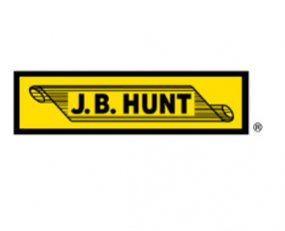
J.B. Hunt has announced its full year 2021 results, with revenue increasing 26.0% y-o-y to $12.2bn. Operating income also rose by 47.0% y-o-y, reaching $1.1bn.
in Q4 2021, revenue rose to $3.5bn in Q4 2021, up 28.0% y-o-y, with all segments contributing to the revenue growth compared with the prior year period. Operating income for the fourth quarter increased 55.0% y-o-y to $322.5m.
The Intermodal (JBI) segment reported a revenue increase of 26.0% y-o-y, with a revenue of $1.57bn. Operating income increased 76.0% y-o-y, reaching $195.3m. Overall Intermodal volumes declined 3.0% over the same period in 2020. Eastern network loads increased 1.0%, while transcontinental loads declined 5% compared to the fourth quarter 2020. J.B, Hunt reported that while demand for intermodal capacity remains strong, ongoing network fluidity challenges driven by rail restrictions and customer detention of equipment, were even further impacted by weather, derailments and COVID-related labour shortages and disruptions during the quarter. Despite these volume-related challenges, the company reported that revenue increased 26.0% for the quarter versus the prior year, driven by a 30.0% increase in revenue per load resulting from changes in the mix of freight, customer rates, and fuel surcharge revenues. Revenue per load excluding fuel surcharge revenue was up 22.0% year over year.
The Dedicated Contract Services (DCS) segment reported a revenue increase of 25.0% during the current quarter over the same period 2020. Productivity, defined as revenue per truck per week, increased approximately 7.0% versus the prior period. J. B. Hunt reported that productivity excluding fuel surcharge revenue increased 2.0% from a year ago primarily from contracted indexed-based price escalators partially offset by lower productivity on start-up accounts and a greater number of open trucks due to the tight labour market and COVID related labour disruptions. A net additional 1,778 revenue producing trucks were in the fleet by the end of the quarter compared to the prior year period, and a net additional 439 versus the end of the third quarter 2021. Customer retention rates remain above 98.0%.
DCS operating income decreased by 6.0% y-o-y. According to J.B. Hunt, benefits from higher revenue and increased productivity of assets were more than offset by increases in casualty insurance expense, frontline employee bonuses, group medical benefits, driver wage and recruiting costs, non-driver personnel salary, wages and incentive compensation, and other costs related to the implementation of new, long-term contractual business.
The Integrated Capacity Solutions (ICS) segment reported a revenue of $739m, up 26.0% y-o-y. The company reported that revenue growth was primarily driven by a 27.0% increase in revenue per load resulting from changes in customer freight mix and higher contractual and spot rates in our truckload business as compared to the fourth quarter 2020. Overall segment volumes declined 1.0% with truckload volumes increasing 3.0% versus the prior year period.
The Final Mile Services (FMS) segment reported a revenue increase of 4.0% y-o-y, p $222.0m. Stop count within FMS decreased 22.0% during the current quarter versus a year ago. The addition of multiple customer contracts implemented over the last year were more than offset by the reduction of stops at several customers due to labour shortages and supply chain constraints. Productivity, defined as revenue per stop, increased approximately 33.0% compared to the prior year period primarily from a shift in the mix of business between asset and asset-light operations.
The Truckload (JBT) segment reported a revenue of $259m; an increase of 85.0%. Revenue excluding fuel surcharge revenue increased 79.0%, primarily from a 55.0% increase in revenue per load excluding fuel surcharge revenue and a 15.0% increase in load count compared to a year ago. The increase in revenue per load excluding fuel surcharge revenue was driven by a 32.0% increase in revenue per loaded mile excluding fuel surcharge revenue and a 19.0% increase in average length of haul.
Source: J. B. Hunt